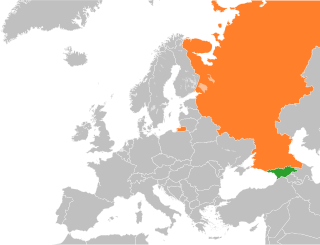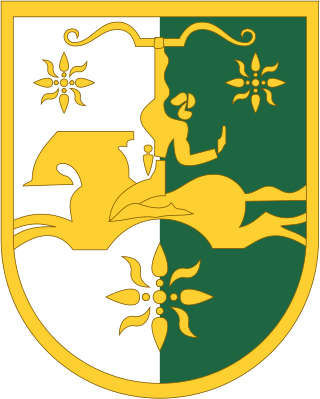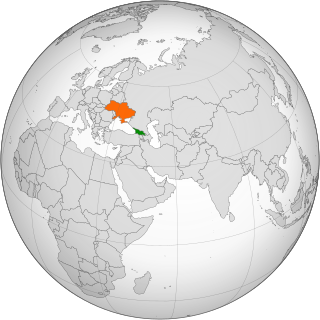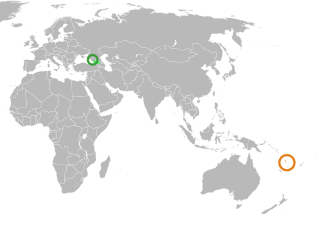Related Research Articles

Burundi's relations with its neighbours have often been affected by security concerns. Hundreds of thousands of Burundian refugees have at various times crossed to neighboring Rwanda, Tanzania, and the Democratic Republic of the Congo. Hundreds of thousands of Burundians are in neighboring countries as a result of the ongoing civil war. Most of them, more than 340,000 since 1993, are in Tanzania. Some Burundian rebel groups have used neighboring countries as bases for insurgent activities. The 1993 embargo placed on Burundi by regional states hurt diplomatic relations with its neighbors; relations have improved since the 1999 suspension of these sanctions.

Cyprus is a member of the United Nations along with most of its agencies as well as the Commonwealth of Nations, World Bank, International Monetary Fund and Council of Europe. In addition, the country has signed the General Agreement on Tariffs and Trade (GATT) and the Multilateral Investment Guarantee Agency Agreement (MIGA). Cyprus has been a member of the European Union since 2004 and in the second half of the 2012 it held the Presidency of the Council of the European Union.

Georgia's location, nestled between the Black Sea, Russia, and Turkey, renders it strategically important. It is developing as the gateway from the Black Sea to the Caucasus and the larger Caspian region, but also serves as a buffer between Russia and Turkey. Georgia has a long and tumultuous relationship with Russia, but it is reaching out to its other neighbours and looking to the West in search of alternatives and opportunities. It signed a partnership and cooperation agreement with the European Union, participates in the Partnership for Peace, and encourages foreign investment. France, Germany, South Korea, the United Kingdom, and the United States all have embassies in Tbilisi. Georgia in 2004-2008 sought to become a member of NATO, but did not succeed in the face of strong Russian opposition.

Kyrgyzstan has close relations with other members of the Commonwealth of Independent States, particularly Kazakhstan and Russia, given the historical legacy of the Soviet Union. It also has close relations with Turkey as well, given their shared heritage as Turkic languages.

The Abkhaz–Georgian conflict involves ethnic conflict between Georgians and the Abkhaz people in Abkhazia, a de facto independent, partially recognized republic. In a broader sense, one can view the Georgian–Abkhaz conflict as part of a geopolitical conflict in the Caucasus region, intensified at the end of the 20th century with the dissolution of the Soviet Union in 1991.

Russia and Georgia have had relations for centuries. The contacts between the two date back to the 15th and 16th centuries, and the most important stage started in 1580s, when Georgian kingdom of Kakheti and Russian Empire signed a treaty of alliance in 1587. Since then, Georgia-Russia relations have been developing vibrantly, and culminated in Treaty of Georgievsk, which established eastern Georgia as a protectorate of Russia. At that time, Georgia saw Russia as a powerful Christian and modernizing neighbor, capable of protecting Georgia from invading Muslim empires and North Caucasian raiders. Although Russia did help Georgia to ward off Lezgin invasions, it failed to protect Georgia when Persia invaded in 1795. Catherine the Great later imposed punitive measures against Persia, but they were cut short by her death. In 1800, Paul signed a proclamation on the incorporation of eastern Georgia into the Russian Empire, which was finalized the following year by Tsar Alexander I. This was followed by annexation by Russia of western Georgian kingdoms and principalities and their incorporation into Russian Empire, namely, Kingdom of Imereti in 1810, Principality of Guria in 1829, Principality of Svaneti in 1858 and Principality of Mingrelia in 1867. Incorporation into the empire ended Muslim invasions and brought peace to Georgia. Russian Empire ended slave trade by Ottomans in western Georgia, which saved Georgia's shrinking population from demographic catastrophe. It also provided Georia with means for a cultural revival, such as Tiflis Imperial Theater, which was opened in 1852 and revitalized Georgia's long-abandoned theatrical tradition. Georgian intellectuals pursued their education in universities of Moscow and Saint Petersburg and brought new ideas to Georgia. However, loss of sovereignty and abolition of the autocephalous status of the Georgian Orthodox Church, along with Russification policy, gave rise to public discontent and rebellions. As a result of Russo-Turkish wars of 1828-1829 and 1877-1878, Russia acquired the historical southern Georgian provinces, such as Adjara and Meskheti from the Ottomans. The unification of historical Georgian lands under Russian Empire and national consolidation of Georgia gave rise to Georgian nationalism, spearheaded by "Tergdaleulebi" movement, a group of Russian-educated Georgian intellectuals led by Ilia Chavchavadze who brought modern nationalist ideas into Georgia. They campaigned against Russification and promoted national identity among Georgians through "Society for the Spreading of Literacy among Georgians" and newspaper Iveria. Their vision did not envisage an outright revolt for independence, but demanded autonomy within the reformed Russian Empire, with greater cultural freedom, promotion of the Georgian language, and support for Georgian educational institutions and the national church. This movement instilled strong sense of national cohesiveness among Georgians, which were divided between various Georgian regional feudal kingdoms and Muslim empires throughout middle ages, and paved the path to the independence, which Georgia regained following the collapse of Russian Empire in 1917. The Menshevik government of Georgia transformed the image of now Bolshevik-led Russia from a source of enlightment into Asiatic state imbued with oriental backwardness and sough ties with the West through its links to Second International. The short-lived Georgian independence ended when Georgia was incorporated in the Soviet Union as the Georgian Soviet Socialist Republic in 1922. The bilateral Russo-Georgian ties were strained again in 1991 due to Moscow's support of separatist regions within Georgia and its intentions to join NATO. Russo-Georgian relations briefly began to improve during the Shevardnadze's presidency, but they became strained again after the Rose Revolution in Georgia. The tensions led to the Russo-Georgian War in August 2008, and diplomatic relations were broken. To this day, the two countries have maintained no formal diplomatic relations since.

The Republic of Abkhazia is a partially recognized state in the South Caucasus which declared independence from Georgia during the War in Abkhazia (1992–1993). At the time, the Soviet Union had recently collapsed (1991).

Since their independence from the Soviet Union, Georgia and Ukraine have forged close political and cultural relations. The diplomatic relations between the two nations are realized at the level of embassies and consulates. Due to the prosecution in Georgia of Georgian/Ukrainian politician Mikheil Saakashvili and the 2022 Russian invasion of Ukraine, relations between the two countries have soured significantly.

Portuguese–Turkish relations are foreign relations between Portugal and Turkey. Portugal has an embassy in Ankara. Turkey has an embassy in Lisbon. Both countries are full members of NATO. Also Portugal is an EU member and Turkey is an EU candidate.

Abkhazia and South Ossetia are disputed territories in the Caucasus. Most countries recognise them as part of Georgia, while Russia, Venezuela, Nicaragua, Nauru, and Syria regard them as independent. Russia's initial recognition of the independence of Abkhazia and South Ossetia occurred in the aftermath of the Russo-Georgian War in 2008. The government of Georgia considers the republics to be Russian-occupied territories.

Relations between Abkhazia and Turkey have not been not officially established. Although Turkey has not recognized Abkhazia's independence and regards it as de jure part of Georgia, the two governments reportedly have secret ties.

Bilateral relations between Abkhazia and Vanuatu were begun when Vanuatu recognised Abkhazia's independence on 23 May 2011. On that day a joint statement on establishment of diplomatic relations was signed. However, the exact nature of the recognition was a matter of dispute and was not regularized until July 2013. However, over the years and part of domestic powerplay within Vanuatu's government, the recognition has swung back and forth. In 2019 Vanuatu's minister of Foreign Affairs "confirmed Vanuatu’s support of Georgia’s sovereignty and territorial integrity" and effectively withdrew the recognition of Abkhazia.

Abkhazia–Syria relations refers to the bilateral relationship between the Republic of Abkhazia and Syria. Syria recognised Abkhazia on 29 May 2018. The establishment of relations on an embassy-level was announced very early. Syria has an embassy in Sukhumi. Abkhazia has an embassy in Damascus.

Diplomatic relations between Turkey and Venezuela were established in 1950.
References
- ↑ "T.C. Dışişleri Bakanlığı - Tiflis Büyükelçiliği - Büyükelçilik Tarihi ve Önceki Büyükelçilerimiz". tiflis.be.mfa.gov.tr. Retrieved 2023-05-06.
- ↑ "Relations between Georgia and the Republic of Turkey". turkey.mfa.gov.ge. Retrieved 2023-05-06.
- ↑ World, Abkhaz. "Anna and the President: A Translator's Story". Abkhaz World | History, Culture & Politics of Abkhazia. Retrieved 2023-05-06.
- ↑ "Turkish Envoy Says Termination of Turkish Airlines' Flights Groundless – Civil Georgia". civil.ge. Retrieved 2023-05-06.
- ↑ "Will Tezgor be appointed Turkish Ambassador to Armenia?". A1Plus. Retrieved 2023-05-06.
- ↑ "The Administration of the President of Georgia". www.saakashviliarchive.info. Retrieved 2023-05-06.
- ↑ "TAV breaks ground on 12,000sq m terminal at Tbilisi Airport". The Moodie Davitt Report. 2016-06-27. Retrieved 2023-05-06.
- ↑ Məmmədov, www mrsadiq info | Sadiq (2022-04-07). "Turkiye names new ambassador to Georgia". News.az. Retrieved 2023-05-06.
- ↑ Circle. "Geocase hosted H.E. Mr Ali Kaan Orbay, Ambassador of the Republic of Türkiye to Georgia - Geocase". www.geocase.ge. Retrieved 2023-05-06.